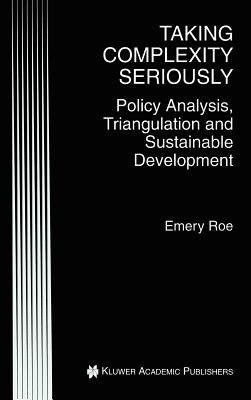
- We will send in 10–14 business days.
- SAVE -10% with code: EXTRA
Reviews
Description
Taking Complexity Seriously applies the advanced policy analysis technique of triangulation to what is now the world's most complex public policy challenge: sustainable development.One central problem of public policy analysis has been to find new ways of analyzing issues of increasing complexity and uncertainty. Triangulation is perhaps the best example of these novel techniques, as it uses various methods, databases, theories, and approaches to converge on what to do about the complex issue in question.
Taking Complexity Seriously uses four different theoretical approaches (Girardian economics, cultural theory, critical theory, and the local justice framework) to triangulation in order to converge on answers to four major policy questions:
- What is sustainable development?
- Why is it an issue?
- What needs to be done?
- What can actually be done?
These four approaches are used to analyze the sustainable development controversy that recently arose in the pages of Science magazine and the journal Ecological Applications. These different approaches prove highly potent in defamiliarizing conventional wisdom about sustainable development. Ultimately the different approaches will converge on novel answers to the four questions. The practical implications of these conclusions are drawn out at the end of Taking Complexity Seriously in a detailed case study of ecosystem management.
EXTRA 10 % discount with code: EXTRA
The promotion ends in 20d.23:25:28
The discount code is valid when purchasing from 10 €. Discounts do not stack.
- Author: Emery Roe
- Publisher: Springer
- ISBN-10: 0792380584
- ISBN-13: 9780792380580
- Format: 15.2 x 22.9 x 1.3 cm, hardcover
- Language: English English
One central problem of public policy analysis has been to find new ways of analyzing issues of increasing complexity and uncertainty. Triangulation is perhaps the best example of these novel techniques, as it uses various methods, databases, theories, and approaches to converge on what to do about the complex issue in question.
Taking Complexity Seriously uses four different theoretical approaches (Girardian economics, cultural theory, critical theory, and the local justice framework) to triangulation in order to converge on answers to four major policy questions:
- What is sustainable development?
- Why is it an issue?
- What needs to be done?
- What can actually be done?
These four approaches are used to analyze the sustainable development controversy that recently arose in the pages of Science magazine and the journal Ecological Applications. These different approaches prove highly potent in defamiliarizing conventional wisdom about sustainable development. Ultimately the different approaches will converge on novel answers to the four questions. The practical implications of these conclusions are drawn out at the end of Taking Complexity Seriously in a detailed case study of ecosystem management.


Reviews